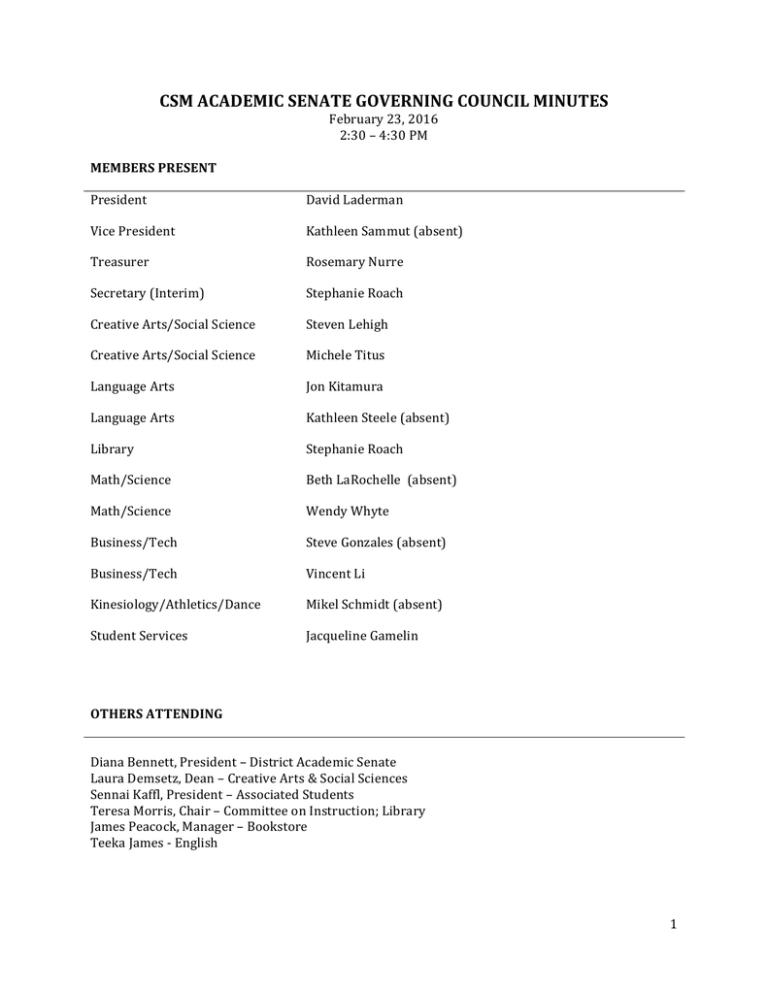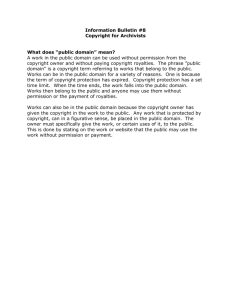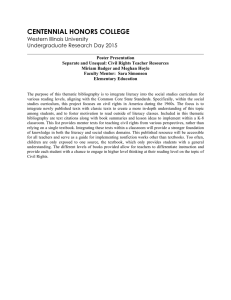Document 14000307
advertisement

CSM ACADEMIC SENATE GOVERNING COUNCIL MINUTES February 23, 2016 2:30 – 4:30 PM MEMBERS PRESENT President David Laderman Vice President Kathleen Sammut (absent) Treasurer Rosemary Nurre Secretary (Interim) Stephanie Roach Creative Arts/Social Science Steven Lehigh Creative Arts/Social Science Michele Titus Language Arts Jon Kitamura Language Arts Kathleen Steele (absent) Library Stephanie Roach Math/Science Beth LaRochelle (absent) Math/Science Wendy Whyte Business/Tech Steve Gonzales (absent) Business/Tech Vincent Li Kinesiology/Athletics/Dance Mikel Schmidt (absent) Student Services Jacqueline Gamelin OTHERS ATTENDING Diana Bennett, President – District Academic Senate Laura Demsetz, Dean – Creative Arts & Social Sciences Sennai Kaffl, President – Associated Students Teresa Morris, Chair – Committee on Instruction; Library James Peacock, Manager – Bookstore Teeka James -­‐ English 1 I. ORDER OF BUSINESS David Laderman called the meeting to order at 2:35 pm 1. Approval of the Agenda (February 23, 2016) and Draft Minutes (February 8, 2016) Agenda The agenda was amended to add discussion of the scholarship committee to the President’s report. Rosemary Nurre moved to approve the agenda as amended, Michele Titus seconded. All were in favor, the agenda was approved as amended. Minutes: Rosemary Nurre moved to approve the minutes, Michele Titus seconded the motion. All were in favor, the minutes were approved. 2. Public Comment (2 minutes per) • • II. Stefan Bryan’s one man show, “Doodu Boy,” performed earlier today was wonderful. Stefan is a CSM alumnus originally from Jamaica. Steve Lehigh has a front page article in the Advocate. Senate members are encouraged to read it. We may be able to use his article as a launch point to revive the topic of workload in April. INFORMATION ITEMS 1. President’s Report a. Scholarship Committee We need three division representatives for the Scholarship Committee. Assuming dates are okay, Teresa Morris will be able to represent us. For clarification, this is to read the Academic Senate scholarship applications, not all applications for all scholarships. We will address this at our next meeting. Of note, there may be a problem with this year’s scholarship application pool mistakenly including applications from last year. More information will be provided regarding the number of scholarship applications the committee will be expected to review. 2. ASCSM Update, Sennai Kaffl, President, ASCSM 2 • • • • • • • Last week Associated Students had the opportunity to meet with and present ideas to the Board of Trustees. It was a good opportunity for student government to get feedback from the board, and an opportunity to meet them for the first time. As part of Black History Month, Associated Students partnered with Umoja to screen a documentary film. Food was provided. ASCSM wants to include more students in the governing and representative process. More committee seats for students are desired. Club Fair is this week. It will be in Building 10 Wednesday & Thursday, February 24th & 25th, from 10:30-­‐1:30pm (time to be confirmed) WTF Film Festival – Competitive film festival (student produced) will be supported by ASCSM Look forward to a Lunar New Year Festival event February 25th by the Chinese Student Association Clarification regarding the IPC meeting scheduled on Flex Day was requested, as students will not be on campus that day. 3. Standing Committee Reports a. Committee on Instruction, Teresa Morris, Chair No report. b. Library Advisory Committee, Stephanie Roach, Co-­‐Chair Discussion focused on professional development resources provided by the library and what faculty would like to see. Suggestions included technology, research resource review, and other workshops. Additionally, potential needs for a survey were discussed. d. College Assessment Committee, Madeleine Murphy, Chair Meetings, discussions and forums are in the works and Madeleine will be reporting out soon. e. Center for Academic Excellence Committee, Theresa Martin, Chair The CAE Committee looked at the draft of the three-­‐year professional development plan. The plan was approved by the committee and will be brought forward to Academic Senate for approval, at our next meeting. Flex Days are March 3-­‐4, and will feature Learning Partnerships for Equity workshops by the National Equity Project. Please share this opportunity with your division, there is limited space available. It is a great opportunity. It is good for relationship building among peers as well as with your students. It features the six circle model for communication that has been 3 implemented by IPC. Finally, the Canvas transition team will be bringing information forward soon. III. ACTION ITEMS a. CIS hiring committee change Mike Brunicardi will substitute for Lilya Vorobey on the committee. Rosemary Nurre made a motion to approve the action. Vincent Li seconded the motion. The committee change was approved with all in favor. b. Program review due date Vote to approve the 4th Friday of October for submission of program review and if it’s an off year, it will be the deadline for a resource request. Rosemary Nurre made a motion to approve the action. Vincent Li seconded the motion. The program review due date was approved with all in favor. c. Program review form revisions A brief overview of the revisions, which have been positively received by various stakeholders was followed by a brief discussion about the practicality of placing people before things on the form, particularly with regards to student assistants and adjunct overload which are included in the “Additional resources request” box. Because student assistants are funded differently, and less consistently than other permanent employees, they don’t fit in with the classified staff category. They were thus put into the “additional” category, which is meant to be a catch all for additional resource needs not covered by the other categories. Additionally, adjunct overload and student assistants don’t have the same budget line item as other new permanent positions. It was suggested that the wording on the form be changed from “Additional resource requests” to “Other resource requests.” Rosemary Nurre made a motion to approve the action as amended. Jon Kitamura seconded the motion. The form revisions were approved as amended with all in favor. The form revisions will be updated in the program review documentation on the CSM website. III. DISCUSSION ITEMS Forum on Textbooks a. Faculty textbook orders (Diana Bennett, James Peacock) There is an habitual issue of CSM faculty not getting their textbook orders in on time. This is problematic. As a result, a lot of time and energy is spent identifying 4 and contacting those who have not sent in their textbook requests, which is burdensome for James, and impacts students’ ability to purchase books on time. The discussion today focused on factors that may be causing the problem, and identifying solutions so that moving forward faculty will complete the order process in a timely fashion. Suggestions included returning to the prior process which used a paper form including a checkbox to use the same material as last semester. It was pointed out that while this was the prior practice, it was discontinued on request of the Division Deans, who were required to sign off on all of the forms. It was noted that Skyline and Cañada do send out paper requests for textbook, but that the Deans are not required to sign off. At this time, many felt we should not yet return to a paper process, but instead should focus our efforts on improving the timely response rate. The below approaches were supported: • Academic Senate should make a formal statement to help make faculty aware of the problems caused by not turning textbook requests in a timely fashion, including the impact on students. • Division meetings with time allotted for James Peacock will be useful by providing face to face time with faculty. • Email directly to the deans once faculty members with outstanding orders have been identified, so that they can help coordinate order submission among these faculty members. • Changes for James to make regarding communications include providing a fillable form embedded in his emails to faculty and providing a calendar event reminder of due date. b. Board policies & procedures 6.27.1, 6.36 & 6.36.1 6.36 & 6.36.1 Regarding Faculty Authored/Edited Texts Discussion focused on faculty members requiring texts authored or edited by the faculty member for their classes. The policy outlines requirements for this practice. Diana Bennett pointed out that the intent of the policy is not to question faculty selections, but to encourage people to be mindful of what a representative text is. There is concern that requirements for internal peer review will be problematic because of small department size and politics. Anonymity will be hard to guarantee as part of this peer review, and collegial relationships could be strained as a result. Most identify the core problem as a conflict of interest when the faculty member is receiving publishing royalties from home institution sales of their texts. Apparently, in certain cases the royalties received are significant, and it is possible that some individuals seek to profiteer off of the practice of home institution sales of their texts to students. However, in many cases, the royalties received from home institution sales are negligible. Bottom line: Is the instructor making money off of the sale of their book to our students? 5 c. Some schools require royalties from required texts in this category be donated to the department (see donations suggestion in draft). Concern was expressed about policing of the issue. Additionally, concern was expressed regarding whether the burden of arranging for royalty donation payments would lie with the faculty author or editor, and whether or not publishers paying out royalties would or could arrange or allow this. Additionally, it was asked if there there were HR legal issues related to this. Summary: There is concern about royalties – is there a way to prohibit profiting off of sales to CSM students? There is also concern about the peer review process outlined in the policy, which in many cases is likely to be uncomfortable for participants. It was pointed out that involving the Dean is problematic, as the Dean may not be an expert in the subject specialty. We also may not want the Dean to be involved in setting curriculum. It was mentioned that students may say something if they feel that the textbook wasn’t appropriate or relevant. The student evaluation form could specify something about this to get feedback about texts from students. As a rule, it was agreed that texts should be a book that is used independently in the field. Specific Recommendations: • Stronger language about donating royalties from textbook sales is recommended as part of the policy. • Donations of royalties to student causes may be preferred over donations of royalties to individual departments. If the royalty issue is removed from the policy – if faculty who use texts they have authored do not receive royalties from sales to CSM students – then the whole conflict of interest issue is removed and the policy and procedure can be simplified, less tense. Regarding Cost of Texts to Students Of note, open educational / open access resources are not currently mentioned in the policy. Encouraging use of these types of resources can assist students with the financial burden of purchasing texts. Textbook & website costs to students (Teeka James) Teeka recounted examples of students she has been working with who are struggling financially, and who as a result are unable to access their homework behind the paywall of online codes. Some must be bought via the publisher and can’t be sold via the bookstore which limits EOPS students, veterans, and others whose financial aid must be spent at our bookstore. Book bundles can be offered to include the access code. But if the resource isn’t purchased as a bundle, then the online access code has to be purchased separately which may present a barrier for students, and is often a hidden cost. The students may not have budgeted for this additional cost, because they’ve been planning on buying used materials, but 6 students can’t purchase a used access code. Further, publishers do not allow sharing of access codes, and thus the Library can’t provide them. Use of these codes was presented as an ethical issue that needs to be discussed by our campus stakeholders. Teeka expressed that she would like to see access codes prohibited, because students shouldn’t have to pay for an access code to take a test or turn in required homework. She feels the student should be able to use the library, or other resources in order to complete required coursework such as homework and tests. The question of which party benefits most from use of resources accessed via an online code was brought up. Is it the student or the instructor? Benefits were identified for both student and instructor. For example: students receive instant feedback and can thus course correct as needed; any auto grading can save time for the instructor; content of materials is curated by the instructor specifically for their class to meet student needs; resources include multimedia and are interactive including online study tools and other online resources; for some courses such as accounting, students need to practice standardized test taking in the online environment which helps them when getting professional certifications. This type of content available via access codes is beneficial. It was pointed out that any given class is not self contained with the cost of tuition – there are additional costs including textbooks and online access codes. Ways to reduce cost of textbooks for students was discussed. We should all strive to keep costs down for students. Open source textbooks are one option, but may not meet the technology needs of certain disciplines. Students should be able to use prior editions, and pay for the current code (two separate purchases) to keep cost lower. E-­‐books purchased as a bundle with access code are often cheaper than print books purchased with an access code. Faculty should be clearer about purchasing options, and clearer about consequences of not purchasing the codes. Other suggestions: Is it possible for a payment plan for students at bookstore when they can’t pay for this type of resource? If students can learn the costs associated with taking a specific section far enough in advance, they can register based on what they can afford. Ultimately, the ethical issue at the heart of this matter is the practice of requiring students to pay for access to vital course activities—this is separate from the value or quality of the content behind the paywall. A financial hierarchy is created among students who can and cannot afford these materials. Communication is helpful but doesn’t address the actual issue, which is the ethical issue about the paywall itself. However, based on the discussion, the paywall may be unavoidable, particularly in some disciplines. 7 Is there a mechanism to support students to purchase the access codes? The Bookstore may have an update come fall on this topic. Putting more money into a way for students to access this type of resource may be the way forward. Meeting adjourned at 4:32 pm Date and time of next meeting: Tuesday, March 8, 2016. Minutes prepared by Stephanie Roach, with assistance from David Laderman 8




